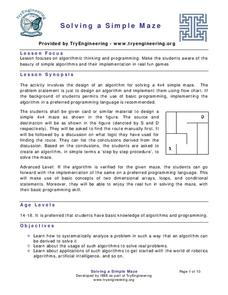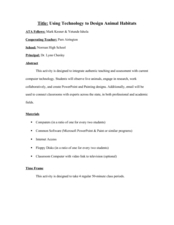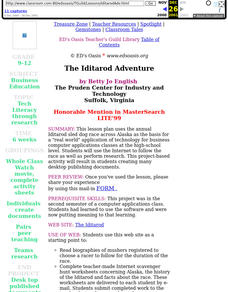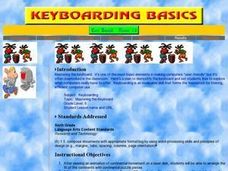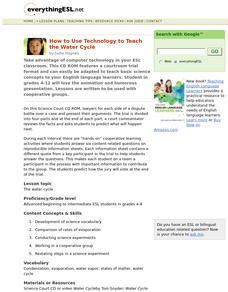Curated OER
Tinker Toys
Learners explore various computer items. They describe possible alternative uses for computer technology. Students explore the practice of "reverse engineering." They write an opinion essay on the ethics behind "reverse engineering."
Code.org
Image Scroller with Key Events
Discover how to embed images in lists. Scholars modify an existing app to include an image scroller in the 17th lesson of the series. They learn to refactor code and remove redundancies after modifying code.
Norton Life Lock
The Nine Ds of Digital Citizenship
A reference page identifies the nine Ds of digital citizenship—digital access, etiquette, commerce, responsibilities, literacy, law, communication, security, health, and wellness.
Code.org
Practice PT - Design a Digital Scene
The final performance task for the unit requires class members to utilize what they have learned to create a personal digital scene. Groups work together to develop a scene and then, using top-down design, break the scene into...
Curated OER
Technology: Narrative Procedure Web Site
Students use Web page templates to publish how-to instructions on the Internet. The Web sites are used as instructional databases for others to view. Students also participate in electronic message boards to post and answer questions...
Code.org
Introduction to Data
Data, data everywhere. Challenge your class to begin thinking about data, the ways people collect information, and what we can learn from this data. Class members discuss sources of data and then individuals answer questions in the...
Code.org
Practice PT - Tell a Data Story
Show your class how it all comes together. The last lesson plan in a unit of 15 has individuals take everything they learned in the data section to analyze the class-generated data. The pupils find a story they want to tell that appeals...
TryEngineering
Solving a Simple Maze
Solve a maze ... from a robot's point of view. In the lesson plan, your scholars build a small, simple maze from cardboard and then find a route from the start point to the finish point. They write an algorithmic process that a robot...
Microsoft
Artificial Intelligence
There's nothing artificial about an informative activity. The eighth of nine parts in the Intro to CS with MakeCode series focuses on artificial intelligence. Scholars learn how artificial intelligence is making its way into society...
Nemours KidsHealth
Cyberbulling: Grades 6-8
Cyberbullying is the focus of two lessons. First, scholars discuss what cyberbullying is, and examine a problem-solving approach to handling cyberbullying, then create brochures on the topic. Second, pupils discuss the effects...
Curated OER
Spreadsheet Project: Planning a Party
Students create a spreadsheet and stay within a budget as they plan a class party for the next holiday.
Curated OER
Microsoft Publisher Assignment One ITB
Students talk about how easy you found it to use Microsoft Publisher. They apply logic to the following scenario and question: You are in business. Tell me what you do. Give five (5) ways you could use Publisher software to help increase...
TED-Ed
What is the World Wide Web?
Did you know that the World Wide Web and the Internet are not the same thing? Did you know that Tim Berners-Lee is considered the father of the Web? Networks, web servers, web hosts, website addresses, domain names, web languages,...
Teach Engineering
Earthquakes Living Lab: Finding Epicenters and Measuring Magnitudes
Pairs use an online simulation to determine the epicenter and magnitude of an earthquake. Using real data about the earthquake's maximum S wave amplitudes, they then determine the magnitude. The resource provides a great career...
Curriculum Corner
Reward Tickets
If you have a SMART Board, iPad, or computer in your classroom, use fun tickets to reward your learners with free play. They describe the activity that kids have earned on a specific electronic device.
NPR
Investigate the Plastic Problem
Plastics are forever. The second lesson plan in a 10-part unit has pupils research the effects of plastics on the environment. They present their findings by creating an infographic.
Howard Hughes Medical Institute
Spreadsheet Tutorial 1: Formulae, Functions, and Averages
Spread your knowledge of spreadsheets. The first of five tutorials in the Spreadsheet Data Analysis unit introduces the basics of spreadsheets. It shows future data analysts how to organize and format tables, and how to use functions to...
Curated OER
Globalization
Students explore the impact of technology around the world. In this globalization instructional activity, students read the noted articles about the effects of technology on day-to-day activities. Students then participate in a classroom...
Curated OER
Using Technology to Design Animal Habitats
Students study the relationship between an animal and where it lives. In this habitats lesson students research to obtain data and create a professional report.
Curated OER
The Iditarod Adventure
Young scholars use the internet to follow the Alaskan Iditarod race as well as perform research. This project-based activity will result in students creating many desktop publishing documents.
Curated OER
Mastering the Keyboard
Sixth graders view an animated program showing how the continents fit together millions of years ago. In groups, they compare and contrast the distribution of rocks and fossils based on how the continents fit together. After reading a...
Curated OER
Case Studies of American Innovation
Studnets discover how the Industrial Revolution came to be in the United States. In this technological advancements lesson, students research creations by Henry Ford, the Wright Brothers, and Thomas Edison. Students create PowerPoint...
Curated OER
How to Use Technology to Teach the Water Cycle
Students answer six content-related questions on reproducible information sheets. They predict how the jury vote at the end of the trial.
Computer Science Unplugged
Harold the Robot — Thinking About Programming Languages
Get young programmers thinking about programming languages with an activity that asks class members to craft directions for one person (teacher, another adult, or a class mate) acting as a robot. Participants direct the robot to...







